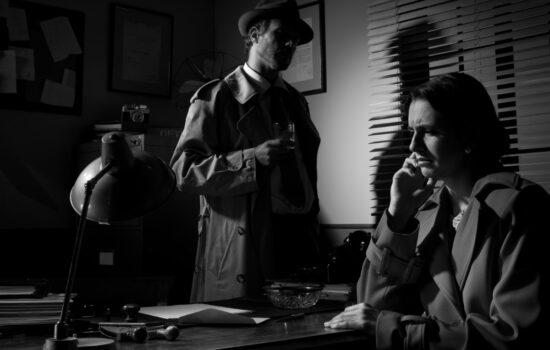Screenwriter/TV Writer
Career Overview
Screenwriters and TV Writers write scripts for film, TV, commercials, and other types of content, including all scenes and dialogue. Their work may also involve writing treatments and series bibles as they build the worlds of the films and shows we watch.
Alternate Titles
Script Writer, Screenplay Writer, Writer, Teleplay Writer, Staff Writer, Movie Writer, Feature Film Writer
Avg. Salary
$117,279 for a spec film script1

How To Become a Screenwriter/TV Writer
People also ask
Career Description
Screenwriters and TV Writers build the worlds we see onscreen. They create the characters we love, keep us on the edge of our seats, and write moments that we think about for days (and even years) after seeing a film or TV show that resonates. They’re responsible for writing the screenplays and TV scripts that Directors and their crews shoot for the screen.
Screenwriters may be hired on assignment to write a script, or they might sell or option a spec script. A spec script is a screenplay a Screenwriter has written on their own with no initial monetary compensation from a production company or studio.
The question everyone asks… How do you break into screenwriting? This video explains what aspiring professionals must do to garner interest in their work and potential future gigs.
A TV Writer is typically staffed on a show and is part of a writers’ room. They will generally contribute ideas to and give notes for each script written for a show, as well as be assigned specific episodes to write for it.
So how do you break into the industry as a Writer? To learn how to build a career as a TV Writer or Screenwriter, we spoke to several professionals who’ve written and created award-winning series and penned screenplays for acclaimed films.
In this article you’ll hear from:
- Pete Goldfinger (Saw X, Jigsaw, Piranha 3D)
- Jen Klein (The Cleaning Lady, The Resident, Grey’s Anatomy)
- Andrew Lanham (Shang-Chi and the Legend of the Ten Rings, Just Mercy, The Kid)
- John Zinman (Last Light, Gold, Friday Night Lights)
What does a Screenwriter do?
Screenwriting encompasses all aspects: TV, movies, some would even say video games. That’s writing for the screen. Technically though, there are TV Writers, and then there are Feature Film Writers. A Screenwriter is usually thought of as somebody who writes feature films. So, to answer your question, “What does a Screenwriter do?” I write movies, and I write a little bit of TV.
The first thing you should know about Screenwriters is they spend a lot of the day in their sweatpants and pajamas. That’s the best part of being a Screenwriter. But everybody’s got their own schedule.
It’s funny you asked this because I had a writing partner named Josh Stolberg. We always work together. He’s a late owl so he sometimes works ‘til as late as three or four in the morning, and I often start as early as six in the morning, but then I’m usually done by about 1:30 p.m. I don’t spend a whole day [mimics typing sounds]. There are only so many hours you can do that. We joke that we’re sometimes writing 20 hours a day when we’re in a pinch, because we have to hand off to each other. But a Screenwriter spends a lot of his day thinking.
My writing partner is more of a sit-down-at-your-computer-and-start-working kind of guy, but I spend every morning usually going for a walk for about an hour-and-a-half after I drop my kids off at school, just going through, in my head, what it is that I want to write. If you really get something in your head then you can write six pages, because screenplay pages are much shorter than when you write prose.
The saying is, if you took a 110-page screenplay and just wrote it in prose as if you were writing a book, it would only be about 32 pages. You can write [screenplays] much faster. So I try to put aside some time to think about what I’m going to write because there’s nothing worse than sitting in front of a blank page.
I don’t know too many Screenwriters who work all day. We love to procrastinate. We love to think of reasons not to write, but that’s why I really try to get into a habit. My family knows that, even when the kids are on vacation, or when they’re in COVID, when my wife is setting meetings for me: I don’t do anything before 1:30 p.m. because that’s my locked-in time to just write.
But then after that, there’s a lot of the business side of writing, which is correspondence with Agents, proofreading, things like that. It’s less of the creative process. The great thing is … I don’t have to write all of the time. But I have to write some of the time. That’s how that works.
A Screenwriter writes the screenplay that then acts as a blueprint for all the different parts of a film’s production.
[The process] depends on the project. It also depends on what you’re writing. Sometimes you can be hired to adapt a book, for instance. If you’re adapting a book, a lot of it is working with the source material to try and remain true to that, while turning the material into a workable, two-hour movie or a TV show.
You could also be hired for someone’s original idea, a comic book, or something that isn’t pre-existing material. A comic book will potentially have hundreds of different things you could do with it, in which case, the process of coming up with that two-hour movie is wider-ranging and up for grabs.
A Screenwriter does one of three things. The first thing Screenwriters do is create stories from their own imagination and put them into a form that can be filmed. They create a script that serves as the roadmap for the whole movie. It will identify the locations, give an idea of what the camera is seeing at any given moment, and it will also set down what the Actors are saying.
So, in effect, a script is not just a story. It’s also a blueprint for a film.
Another thing that Screenwriters do is adapt pieces of intellectual property. Novels, plays, video games, comic books; they take those stories and translate them into a filmic form.
The third thing that Screenwriters do is rewrite other people’s scripts. Oftentimes, Writers are brought in to do polishes. If a Writer has a particular skill, they’ll rewrite other people’s scripts as well.
“Screenwriter” is a word that, outside of Hollywood, is assumed to be anyone who writes a script. But inside of Hollywood, “Screenwriter” usually refers to a Movie Writer, and “TV Writer” refers to a TV Writer.
We write scripts. In the feature world, there are three different ways you can make money: you can write an original script that gets sold and made; you can pitch on an open writing assignment; or you can sell a pitch.
So sometimes a studio will say, “I have this piece of intellectual property,” or, “We want to do a movie about pirates,” and then Writers will be invited to come in and pitch. Alternatively, you can sell a pitch, which is where you come in and do a full pitch for the story.
TV Writers are generally hired to a staff with a full-time job for the length of that show’s writing season. They break stories in the room, then write the scripts, then usually go produce them as well.
Is a Screenwriter a good career?
The career of a Screenwriter can be a highly fulfilling one in terms of the creativity a person can enjoy in service of their professional pursuits.
But anyone considering a career as a Screenwriter should prepare themselves for the many challenges they will almost certainly face during it. The screenwriting world is rife with competition, and as with any industry where there is more supply than demand, it can lead to much rejection and disappointment.
Aspiring Screenwriters should know that they will likely have very little stability or security in terms of consistent work or payment. And even those who have had some success in the industry must always be hustling and connecting with others to keep their name in the minds of those with hiring or buying power.
Salary
The recent Writers Guild of America strike resulted in more beneficial rates for both TV Writers and Screenwriters who have membership in the union.
Right now, the minimum compensation for an original screenplay plus treatment is $160,084.
For a TV Writer who scripts a 30-minute teleplay plus story for a network prime time show, the minimum compensation is $29,823. Should they write a 60-minute teleplay plus story for a network prime time show, the minimum compensation is $43,862.
What are different ways to earn a living as a Screenwriter? This video touches on the need for script doctors and rewrite pros.
What a Screenwriter or TV Writer is paid for their work depends on several factors, including the nature of the medium and whether or not they are part of the Writers Guild of America (WGA). WGA minimum rates vary based on the type of content.
To see firsthand the many, many variations of compensation rates for all types of writing content, check out the most current WGA Schedule of Minimums.
It’s also important to keep in mind that both Screenwriters and TV Writers are typically repped by one or all of the following: Managers, Agents, and Entertainment Lawyers. Each of these individuals will receive a percentage of a Writer’s salary for their services.
How do TV and Screenwriters make money?
Screenwriters get hired for specific jobs and then get paid half at the start and half at the end.
Making enough money to live off of with screenwriting is definitely hard. Once you get your foot in the door, you still have multiple years ahead. At least for me personally, I still had multiple years ahead of me before I didn’t need a second job on top of it.
So you really have to be doing it for the love of doing it. There were seven people at my graduate program, and they’re not all writing film right now, but a lot of them are in the industry in different ways. If you have a love of film and you want to be a part of the industry, getting some sort of training in writing and doing the writing can lead to other opportunities in film.
There are a couple of ways. One way–and this is sort of the golden ticket version which everyone dreams of–is you write a script in a coffee shop or your little home office, crank it out, refine it, and then start figuring out who you can get to read it. Then someone reads it and they like it, and they get you into the hands of an Agent.
The Agent says, “I have to sell this!” and then you sell it. You get what’s called a big “spec sale”—a script that was written on speculation, meaning no one was paying you to write it. You write it without any guarantees of making any money, then you put it out in the marketplace and someone likes it enough to buy it. That’s the home run. That’s what everyone starting out wants.
The other, more usual way is you write a couple of scripts, you start building your network, you start getting people to be familiar with your work, and you find people who support your work and believe in you. Eventually, someone will say, “Hey, you know what? I have a project. Why don’t you come up with a pitch?” Then you get hired to write a script.
An ancillary of that approach is someone likes your work and then you say, “I have another idea. Let me tell you about it,” and you pitch your idea, and they like it enough and believe in you enough as a Writer to say: “I’ll pay you to write that script.”
That’s where most Writers make their money, on assignment work, which means the studio has a project that’s an open writing assignment. They’ve got a book, or they’ve got a piece of intellectual property that they want developed.
The other way is that Writers pitch an idea for a story, and they get hired to write it. And then, of course, there are spec scripts. So those are the three main avenues. But in terms of people just starting out, the way they get paid is they write. They find someone who believes in them enough to hire them. That’s the usual approach.
It’s so varied. You can make so much money, and you can kind of make nothing. It’s all over the place.
I worked in animation for a while; you don’t make a ton of money in animation. When I say animation, I don’t mean something like The Simpsons–I’m sure the Writers for The Simpsons are doing just fine. I mean preschool animation. A lot of it is freelance, so you’ll get like one script. You might get a few scripts over the course of a show, but you’re not there with a stable weekly paycheck. (Although some animated shows do pay like that.)
[With] classic TV, let’s talk about primetime TV because that’s what I know. My world is network broadcast TV. I’ve not been on a cable show, I haven’t been on a streaming show; I’ve been at ABC and FOX. With that classic structure, if you’re hired on a writing staff as a low-level Writer—and by that I mean level one, two, maybe three depending on what you negotiated—you’re paid a weekly salary.
Then during your first year on staff, you aren’t paid a script fee if they give you a script, because the assumption is that you’re gonna be getting a lot of help from everyone else. I don’t fully agree that this is a cool thing, but that’s the setup.
So weekly setup, weekly paycheck. If you’re past level one, you get a script fee. You’re paid for the script, and then if the script gets played over and over, you get residuals which is pretty nice. After level three, or sometimes at level three, you usually graduate to being paid episodically. That means if you’re on a show that has, say, 20 episodes for the season, you’re gonna get a certain amount of money for each episode.
The assumption is that you, as a mid-to-high level Writer, are helping with everyone’s episode. You’re part of breaking the season in the room, all those conversations. Then you’re also paid a script fee when they give you a script that’s yours to write.
Well, they wait a lot of tables. I will tell you this: it’s not usually an immediate trajectory into screenplay writing. It happens, and when you hear about it, it’s a big story, but there are not too many 22, 23, 24, 25, 26, 27, 28-year-old Screenwriters. I mean, most of the guys I know who write screenplays, they broke in somewhere between ages 27 and 35.
I broke into this business when I was 37. I was teaching English as a Second Language down in Compton. That’s what I was doing. But all of that wove a terrific tapestry for me to have things to write about.
So, it’s not the end of the world if you don’t get something right away. One thing to do is try to get a job as a Writer’s Assistant on a TV show if you can. That’s the best job you can get—any job on a TV show. A Gofer; somebody to go get lunch every day. Whatever it is, it’s a great way to break in.
When you first graduate from college or you first come to L.A., you have a freshness to you and people might want to help you. Eventually, you’re going to have to write, too. You’re going to have to write something great. But if you don’t know anybody and aren’t making any connections, it’s really hard to get started.
But I will say this: it’s a great living if you can make it. I have my ups and downs. My dad was a Doctor, my grandfather was a Doctor, my brother’s a Doctor, and so it’s very hard to manage the ups and downs of finances that come in. Some years I make enough money that I could live on it for four years.
Some years I make nothing. It’s up and down. It can be very mercurial, like right now. Things were going really well for me, but then COVID came, and now most everything is shut down.
So if you’re a person that really needs to have a steady income to keep your sanity—and I’m kind of one of those people—this may not be the business for you. But if you’re okay waiting tables and doing other things, and you can find joy in those things, and you absolutely want to be a Screenwriter, I’d recommend it.
How much does a Screenwriter make?
It would be so much easier if we could provide a simple, solid salary figure for what a Screenwriter makes. Unfortunately, that’s not the case in this particular profession.
First of all, aspiring Screenwriters should know that there will be months or years where they receive no income for their work. In fact, many Screenwriters spend the majority of their careers without consistent pay.
Should a Screenwriter be able to sell a script or get hired onto a project, though, their salary will depend on factors such as the medium they’re writing for, their prior portfolio of work, the individuals who hired that Screenwriter, and the Script Writer’s union status.
Mediums such as web series or streaming television shows generally have smaller budgets, which translates into smaller salaries for Screenwriters. However, a Screenwriter who is established in the industry may be able to negotiate for a higher wage regardless of medium.
But even feature films can vary widely in terms of budget. Should a film be an intended blockbuster backed by a major studio, the Screenwriter hired to write it will almost certainly earn more than someone hired for an indie. It should also be noted that the Writers Guild of America stipulates minimum rates for its members, which generally works in favor of the Screenwriter.
Hey, what do you think about trying our new Film Career HelperFilm Career Helper really quick? It’s totally free and could help get your career moving fast! Give it a try. It’s totally free and you have nothing to lose.
Career Outlook
The professional life of a Screenwriter or TV Writer is one that will likely have a series of ups and downs throughout its course.
Writing for the entertainment industry is an incredibly competitive field. That being said, there are multiple opportunities for both Screenwriters and TV Writers to get noticed and hopefully employed for their craft.
Given the sheer number of individuals who want to write for film or television, many aspiring Screenwriters and TV Writers look to competitions and fellowships as a way to gain traction in the industry and the attention of Managers or Agents who may want to represent them.
Multiple organizations also provide introductions for Screenwriters and TV Writers to those individuals, again with the hope that they may want to represent or collaborate with them.
What does it mean to be a working Screenwriter? This video provides some insight into the lifestyle of a professional Script Writer and what you can expect in this career.
Just like virtually every other facet of the industry, it’s also up to Screenwriters and TV Writers to take initiative and make connections on their own to help buoy their future success.
Even with the many options available to aspiring Screenwriters and TV Writers, the vast majority of them will likely need to supplement their income via other professions such as copywriting, teaching, or any number of other outlets as they work to become Writers who are fully financially sustained through their screenwriting or TV writing work.
It’s important for Screenwriters and TV Writers to also keep in mind that even with a sold script or staffed position on a TV show, they will likely need to continue making connections and advocating on their own behalf for the entirety of their careers.
Career Path
The career path of a Screenwriter or TV Writer will probably not be a linear one.
Many specialties in the entertainment industry do not require professionals to get formal training in them. That being said, film schools across the country offer screenwriting majors and courses for interested students, and some aspiring Screenwriters or TV Writers choose to get a foundation of expertise through them.
Beyond this type of education, it’s largely up to a Screenwriter or TV Writer to be as much their own PR Rep as a writing expert to draw attention to their skills and hopefully attract work. Much of what a Screenwriter or TV Writer will do–outside of writing!–is creating a professional network with individuals who may be able to use their skills or promote them.
While a Screenwriter or TV Writer doesn’t necessarily have to have a Manager or Agent, one or both of these individuals can be instrumental in helping to advance their career. For this reason, attaining representation is considered a career milestone for a Screenwriter or TV Writer. Many Writers also use the services of an Entertainment Lawyer during their careers.
Months and often years can go by between “gigs” for a Screenwriter or TV Writer, which makes it important for someone entering this field to accept this type of ebb and flow career. The reason for these sometimes substantial lulls often boils down to projects being abandoned before they make it to completion.
What does it mean to write a script for a studio? This video breaks down the many ways a Screenwriter may get a studio gig.
An aspiring Screenwriter or TV Writer must understand that many of their scripts will never be produced. Moreover, jobs that they are hired for may also never see the proverbial light of day on-screen, be it in a theater or in someone’s home. People who are attached to a script may drop out, which can impact its viability moving forward, or those who were going to financially back it may likewise decide to pass on the project.
For these reasons, many Screenwriters and TV Writers may decide to take matters into their own hands and produce projects. Many Screenwriters become hyphenates such as a Writer-Director or Writer-Producer to have more control over their work. TV Writers may decide to produce their own web series or another example of their work to get the attention of those who could greenlight a bigger project.
While this is a career path may contain moments of frustration and disappointment, it’s also one that can bring great creative fulfillment and excitement.
How do you become a Screenwriter or TV Writer?
Whenever I talk to young people starting out, I advise them to do two main things: read as many screenplays as you can, and write as many screenplays as you can. Reading screenplays starts to train your mind to think in that language because it’s a very particular format. It’s not like writing a short story. It’s similar, but it’s not the same.
So I recommend reading. Get your hands on scripts. They’re all available online now. Any film or TV show that you admire, read the script. Then, I recommend reading the script while you’re watching the movie. Have the script in your lap while watching and see what changed and what stayed the same. How did they translate it from the page to the screen? Start getting a sense of how to think visually as you’re writing.
Screenwriting is like any other muscle. You have to train it. And the other thing about writing is: you’re not going to get worse by writing more—you’re only going to get better.
Most young people are impatient–myself included when I was a young person. They want to get out there and have people read their work immediately. I think it’s a mistake to have someone of influence read your first effort. It’s not going to be your best. You’re going to look back on it in ten years and go, “Oh my God! I can’t believe I wrote that.”
Be patient and write as much as you can, because you’re going to get better; significantly better. There’s a lot of generosity amongst people in the industry to help support young people breaking in. You’ll be able to find someone who’s going to read your script, whether it’s through an alumni network or a friend of a friend.
And when you start pursuing people to read your material, make sure it’s the thing you want them to read, because it’s a two-hour commitment you’re asking for. They’ll read one, but they might not read two. So make sure it’s the one. Be patient, write a lot, then make your move.
I get asked this question so many times but particularly by young Writers who have stuff written, and they just don’t know how to get it into somebody’s hands. And it’s the hardest thing to sort of tell people because what you need to do is you need to write stuff and get people to see it. That’s what you gotta do. And believe me, getting people to see it is as hard as the writing part of it.
Everybody has a different way that they broke in. My way is so unusual. One of my best friends is Lauren Graham who was on Gilmore Girls. Keep in mind, at the time she wasn’t “Lauren Graham from Gilmore Girls,” she was just Lauren Graham, and she was a friend of mine.
And so, she got on that show, and they gave her what’s called a vanity deal. They give their stars sort of a pod producing deal where they can produce a few TV shows, and I was the only Writer she knew. So she was like, “Alright Pete, come on in and pick something.” So that’s how I got my WGA [Writers Guild of America] card.
For most people, that’s how the story goes. They knew somebody and they got their script into that person’s hands. But what you can’t do is write something, have somebody read it that’s like an Accountant—say your dad went to college with the Accountant for Johnny Depp—who doesn’t know anything about the business, reads it, and doesn’t do anything with it.
You gotta keep getting it out there. The hardest thing is keeping your chin up until your script finds the right audience; until it lands on the right desk. I just said those words, but I wrote a script about a year ago that I showed to my Agent and he didn’t love it, and I was like, “I don’t really wanna go out with it.” So you gotta be stronger than I am. You gotta keep believing in yourself and keep getting it out there.
The way you become a TV Writer has changed a little bit. With the advent of so many different kinds of TV, I think there are more opportunities out there. What seems to be the most common path right now is to come into TV through the support staff world.
You might be a Writer’s PA, then you might be a Showrunner’s Assistant or a Writer’s Assistant, and then someone gives you a shot and lets you have a freelance script. Or they let you get half of a freelance script where you split it with a Writer in the room. Then, if it’s received well, they staff you.
I honestly don’t know as much about the feature world right now. The way in probably involves writing spec scripts and trying to get them read by someone, whether it’s by an Agent, a Manager, or an Entertainment Lawyer. Someone who can get you past the gatekeepers. Someone who can get you to an Executive or a Producer.
The key is representation. Everyone needs to have representation eventually. People can get in through different ways, especially if you go to support staff. You don’t need a rep to become a Writer’s Assistant. You just need someone to say, “Hey, this job is open,” and open the door for you. But generally, once you’re at the point where you’re getting jobs, you have an Agent, or Manager, or Lawyer, or all three.
Firstly, you should just start writing screenplays. If someone wants to be a Novelist, people say, “Just go write.” The answer for screenwriting is the same: just go write.
At the same time, you need to be aware that screenplays, especially in the Hollywood system, have a specific structure and set of rules that they have to follow. So write and put the hours in, but also figure out how to gain greater knowledge of those rules and that structure. Those two things go hand in hand in order to have a chance of making it.
The best way to break into the industry is to win one of the screenwriting competitions. I won the Nicholl Fellowship and the Austin Film Festival when I was in graduate school. The competition is fierce. If you can break into those by winning or placing in those competitions, it becomes way easier to get an Agent or a Manager.
I spent two years in school studying screenwriting before I won those competitions, studying and practicing the form, getting someone to teach me the nuts and bolts. I couldn’t put a price on that. I wouldn’t have broken in if I hadn’t done that.
What is the difference between a Screenwriter and a Script Writer?
In general, there is little difference between a Screenwriter and Script Writer.
That being said, Screenwriter can be considered a term used specifically for someone who writes feature screenplays. In contrast, a Script Writer might be used as a more general term for someone who writes any kind of script whether that be for film, television, the web, commercials, or another medium.
Experience & Skills
While multiple screenwriting programs can help to teach an aspiring Screenwriter or TV Writer how to properly format a script, it’s important that they understand all the various components of a script and why each is necessary for this type of storytelling.
Beyond technical expertise, Screenwriters and TV Writers must also understand how all the many elements of writing for the screen should come together to create a cohesive and compelling story. Some of these elements that a Screenwriter or TV Writer must masters include:
- Act structure
- Character development
- Concept
- Plot
- Theme
Some Writers may aspire to be only Screenwriters. Some want to be only TV Writers. And another segment of this creative community may want to write for both film and television.
Emmy-nominated Screenwriter Amy Aniobi offers up her firsthand advice on how to set yourself up for professional success in this industry.
Regardless of the category they ultimately fall into, all Writers should know that there is no single formula that works for each script–especially when crossing over from film to television or vice versa.
Elements like act structure and plot development are considerably different for a feature script versus a TV script. They even differ between a one-hour script and a half-hour script! For these reasons, Writers must know and understand these differences.
A great way to understand what makes a great script in general and a great film or TV script specifically is to read other screenplays and teleplays! It’s never been easier to access Oscar-winning and Emmy-winning scripts online. Study them. Critique them. Figure out why they resonated so well with audiences.
Outside of their specific writing capabilities, Screenwriters and TV Writers will also be expected to competently pitch their stories to others. Though some Managers, Agents, or Producers may become acquainted with a script just by reading it, just as often they learn of the property directly from the Writer.
In short, a Screenwriter or TV Writer must know their scripts so well that they can successfully explain to someone else what they are about–and often in just a matter of minutes! Hand in hand with these skills is the ability of a Writer to network with others and advocate on their own behalf for potential jobs.
What skills do you need to be a TV Writer or Screenwriter?
On the writing side, the best skill that a person could have to be a Writer–whether it’s a Screenwriter or any other kind of Writer–is curiosity and good observational skills. Understanding people and being curious about what makes people tick.
From a business standpoint, you need a sense of the practicality of what you’re writing. Screenwriting is show business after all. You should follow your creative vision, but be tempering that with a sense of what is feasible from a mechanical standpoint.
Can it be done and accomplished in an economically feasible way? Can you actually film what you’ve created? Especially in the sci-fi realm. Can you actually do it and at a price point that will make sense for a studio to take that financial risk?
You also need to have a sense of what’s popular. I think it’s a mistake to try to write to the marketplace, but it’s also a mistake to completely ignore the marketplace.
Another note from a business standpoint is that you should go into this with the knowledge that it’s an incredibly competitive field. Don’t have unrealistic expectations of becoming an overnight sensation early on in your career.
I believe that most people who stick with it eventually find their way. You have to be patient, and you have to find ways to stay financially afloat while you’re pursuing your goal of making it as a Screenwriter. It takes time. It’s a skill that needs to be developed, and any skill that needs to be developed requires time, patience, and persistence.
Just be a good storyteller. That’s it. That’s the only skill you have to have. No degree. I’ve never been to a meeting where someone has asked me where I went to college or what my degree was in. Nobody cares. It doesn’t matter.
There’s a guy named Greg Malins. He was the Showrunner on Friends, which means he ran that show. He must have been in his thirties, maybe mid-thirties. He took over for the Showrunner, but he didn’t go to college. He graduated from high school. He was an Assistant on a show called Dream On on HBO … and then he just worked his way up because he’s a great storyteller.
If you can tell a good story out loud, if people say, “Gosh, you tell good stories,” you would probably make a great Screenplay Writer because it’s active. It’s an active story. That’s a good way to look at it.
Now some (and that doesn’t mean all) Screenwriters are good storytellers. In fact, Screenwriters are known for being kind of lame in a room because they’re always thinking about the page. But if you tell a good story, you could probably be a Screenwriter. What you don’t need to have is prose; don’t worry about your penmanship. So many good Writers get sunk believing that they can’t write because they’re bad spellers. That’s just crazy.
Beyond writing, you need to have a love for the medium. Whether it’s features or TV, you have to love it, to want to be in it, and feel grateful.
When I was in my 20s and new to L.A., you’d always run into this certain ilk of dude who was like, “Hollywood is crap! Hollywood puts out crappy movies and crappy TV! I’m here to be the next brilliant bolt of lightning to change the world.” And those guys never became the next brilliant bolt of lightning to change the world.
You have to come here and love it and want to be a part of it. That doesn’t mean you have to love every TV show or every movie, but it should be exciting to you. You shouldn’t think, “This is bullshit, and I’m here to fix it!” No one wants that guy.
In terms of writing, you need to understand structure. You need to know how to write dialogue. I think those things are kind of obvious. There are lots of great resources out there to help you learn. It also helps if you can write prose. In a script, it’s mostly in action lines where you see prose. But you can write that in a snappy, memorable way, or you can write that in a flat way. People would rather read the snappy, memorable way.
Plus, there are parts of the writing process that are prose-heavy. In TV, one of the steps to writing an episode is creating a story doc. A story doc is about two to five pages (depending on the show you’re on) and it says: “Here’s what this episode’s gonna be about, here’s what my character’s journey will be, here are the exciting moments, and here’s the splashy ending.” That’s three pages written in prose. So it helps if you can do that.
Hollywood has a long history of being littered with terrible people, and yes, terrible people can make it and be wildly successful. However, most of the successful people that I see fight for their creative vision, but they do it with a spirit of generosity and cooperation. I think it’s important to reach back and pull up.
It definitely helps to love movies. It also helps to love books, reading, and different forms of narrative in general; plays, television, all of it. It’s a hard industry to break into. Even if you do manage to break in, it’s a hard industry to be successful in and to keep getting those jobs. So having a real love for what you’re doing is key.
Education & Training
As mentioned, some Screenwriters and TV Writers begin their professional careers with a formal education in screenwriting or TV writing.
Some organizations also offer less comprehensive writing classes–think a few weeks or a few months of instruction–to help aspiring Screenwriters and TV Writers find their footing.
The internet likewise offers a range of free resources via screenwriting-centric websites or sites such as MasterClass and YouTube that aspiring Screenwriters and TV Writers can take advantage of anytime they want for no little or no cost.
Do you need to go to film school for screenwriting? This video discusses the fact that learning the craft isn’t limited to just a few years of higher education. Rather, it’s a lifelong pursuit.
Several fellowships exist that also aim to educate and deepen the expertise of aspiring Screenwriters and TV Writers.
While no formal training is required to be a professional Screenwriter or TV Writer, it’s often in the best interest of someone wanting to write feature or TV scripts to learn the basics – especially formatting basics – as they build their writing careers.
Just as with finding and reading screenplays and teleplays, there is no shortage of “how to” screenwriting books for aspiring Screenwriters to consume. Some of the most popular ones include:
- The Coffee Break Screenwriter: Writing Your Script Ten Minutes at a Time by Pilar Alessandra
- The Nutshell Technique: Crack the Secret of Successful Screenwriting by Jill Chamberlain
- Screenplay: The Foundations of Screenwriting by Syd Field
- Story: Substance, Structure, Style, and the Principles of Screenwriting by Robert McKee
- Save the Cat! The Last Book on Screenwriting You’ll Ever Need by Blake Snyder
Beyond reading, learning, and understanding the craft of screenwriting, though, is the actual act of doing it! To strengthen your skills and grow your confidence in those skills, you must write. A lot.
That means setting up a writing schedule. That also means getting comfortable with the other writing tools that you must create for your craft in addition to spec scripts. Loglines. Beat sheets. Outlines. Treatments. Get to know them all.
While there’s no guarantee of success in the entertainment industry, by taking advantage of every opportunity available to you, you can certainly increase your odds of becoming a working Screenwriter.
What do you major in to become a Screenwriter?
The right answer is probably film and TV, theater, or creative writing. Something like that. But the most important thing is to find something where you’re encouraged within the college setting to find your village and work with your village.
If you’re making short films together, putting on plays together, writing a school newspaper together, or writing stories together, that’s your first village. It’s a group of people who learn to help each other, trust each other, give artistic feedback, and listen to other people’s feedback.
It’s not like you need to have this major or that major. It’s a matter of putting yourself in a place where you have peers who are doing the same thing together. Then maybe some of them will also choose to go to L.A. or to the same place to pursue that goal. They’re your beginner village. Then when you move to Los Angeles or whatever city you choose, you start to grow your grown-up village.
I got my MFA in screenwriting at UT Austin. It was a small, seven-person program. It was amazing. I studied screenwriting there, but my major in college was communications. I did film theory, so that speaks to my whole thing about watching movies, paying attention, and learning the construction of films on a writing level.
You don’t necessarily have to go to school to break into the industry. Tons of people don’t. There are also online classes and screenwriting books. What’s key is finding some way to get feedback on your writing from other people. People often say screenwriting is primarily rewriting, which is totally true. The people who have careers are able to revise, rewrite, and get back into it over, and over, and over again.
So, getting to a place where you’re able to get that feedback is essential. For me, grad school did that. Grad school also gave me the hours of the day to be able to write instead of work, because I had student loans.
Michael Arndt talks about how he worked really hard for a year to save up money, then took a year off and just wrote. Do whatever you need to do in order to find the time to put in hours and get some sort of avenue for feedback.
I was a drama major in college. I didn’t go to film school. I don’t think it’s a requisite.
That being said, there are advantages to going to film school. A lot of Writers who I’ve met and worked with have gone to film school. The advantages are that everything that I’ve recommended people do, you’ll be forced to do in film school. There’s a benefit to the regimentation of an academic environment. And if you can afford it, you’re going to make a lot of great contacts in film school. The people you go to film school with are going to become your instant community.
My experience in Hollywood is that everyone that I started out with who were Assistants, fledgling Writers, or waiting tables: they’re now running this town. The people you end up going to film school with are going to be the people running Hollywood in fifteen to twenty years. So there’s a built-in benefit, which is the networking component of film school. It’s a very expensive network to buy. But if you can afford it, I don’t think it’s a bad idea.
You’re going to come out of film school with a lot of skills that you’d otherwise have to acquire on your own, but it is possible to acquire those skills on your own. Here’s the thing: I don’t think anyone can be taught how to write, but you can be taught how to write a screenplay. There’s a difference.
You can become an adequate Writer, but you’re either gifted, or you’re not. I don’t think film school’s going to teach you inherent artistic inspiration, but it’s going to teach you form and craft. And by the way, you can make a career out of form and craft. You don’t have to necessarily be some rarefied genius to have a gratifying career in film. You can write good, competent, professional, craft-driven scripts.
But the other component is, if you are gifted, if you’re someone who’s always written short stories, plays, and has always had an affinity for creativity, you can teach yourself the craft part of it. The form of a screenplay. You can learn it on your own. Film school’s just going to make it a lot easier for you to get there.
[If you’re not going to film school] I recommend they major in English, or if they don’t major in it, I would say anything in the humanities. It’s helpful to be reading a lot of novels, especially novels that talk about the human condition.
Maybe take a class on playwriting or a class that will require you to read a lot of plays, so you get that dramatic structure into the rhythm of your brain. Maybe take some sociology classes to understand more about people through an academic lens.
It doesn’t hurt to be an English major, but I’ll tell you something: my brother went to medical school. He actually went to Harvard. There was some medical show … I think it was ER. They came to the medical school and asked if anybody would like to take some time off from graduate school to come work writing on a TV show, because they needed people who knew something about medicine.
So, really anything you major in, you could probably apply [to screenwriting]. I know a guy that’s a Lawyer; he’s a really successful Writer. He doesn’t write about law. He just got a law degree.
English would probably help. If you like to write stories, that would help. But the great thing about it is you just have to have a little discipline.
Fun Facts
As of 2024, the Writers Guild of America West includes just over 25,000 full and partial members.
Additional Resources
Screenwriters and TV Writers can test their skills through a plethora of screenwriting contests. Among some of the more reputable competitions are the Academy Nicholl Fellowships, the Austin Film Festival, and Final Draft’s Big Break.
Note that generally all screenwriting competitions require an entry fee.
Aspiring Screenwriters and TV Writers can also submit to any number of fellowships. Though highly competitive, these fellowships are completely free to enter and can provide a substantial steppingstone for any Writer’s career. Among the more well-known fellowships are the Disney Entertainment Television (DET) Writing Program, the Paramount Writers Mentoring Program, and the Warner Bros. Television Writers’ Workshop.
As mentioned, Screenwriters and TV Writers can look to alternate resources to help hone their writing skills. Organizations like Script Anatomy, Writing Pad, and MasterClass offer in-person and online classes.
FAQ
Do you have anything else you think aspiring Screenwriters and TV Writers need to know?
Almost everyone I’ve worked with who’s been a Writer’s Assistant or at the lower tiers, who networked enough and stuck with it, has gone on to have a career in some way, shape, or form.
Not all of them are superstars. Not all of them are living in some mansion in the Hollywood Hills. But most of them are working in Hollywood and making a living. It can be done. I know it’s daunting, and it’s scary, and it feels like this big mystery. But the greatest skill that a Writer can have is perseverance.
If you can stick it out, you’re gonna find your way. That’s assuming you have a baseline level of talent, a baseline level of discipline, and work hard. But if you put in the work and the time and stick with it, you’re gonna find your way.
When I was starting out, the thing I always heard was: if you can do anything else, do it. I always hated when people said that! I thought that was so pessimistic and discouraging. It wasn’t useful advice at all. I don’t want to leave anyone with that kind of pessimistic advice.
My advice is: if you really want this, go for it, work hard, stick with it. Don’t quit when you feel like quitting, because it’s like musical chairs—the last one seated gets the job. If you stick it out, you’re gonna make it.
Yes, I do. There’s something called The Black List. You can find it online, and it’s a place to submit your script and get feedback on it. A lot of insiders read The Black List looking for scripts.
So, I would recommend paying probably $50, whatever it is, to have your script, get coverage on it, and even if it’s terrible, you’ll get some feedback. But if it isn’t terrible, there’s a chance you get great feedback, and then somebody calls you, and then you’re off and running. That’s a way that you could break into the business.
Read everything. Read screenplays. Don’t just watch movies, read screenplays. Understand something called the three-act structure. You can find books on it—there are a lot of good ones.
But mostly read, read, read. Read a ton of scrips, and write. Don’t expect everything you write to sell. It doesn’t. My track record on things I’ve sold versus things I haven’t is probably 15% of what I write I sell. Even to this day, I write things that don’t sell. So that would be my advice.
Remember that part where I said you don’t have to have an English degree? The other part of that is, you have to be your own expert. If you want to write a movie that’s a buddy road-trip comedy, see Due Date; go see them all. If you’re going to do a bank heist robbery, go see them all. It’s a fun thing to do. If you’re going to write an animated movie, go see everything Pixar’s ever made.
And don’t just watch them for fun. Watch to learn. When you see a Pixar movie, here are some questions to ask yourself. Does the protagonist have a mother? Because in a lot of ones there’s no mother. Does the protagonist talk to the camera? Does the protagonist disappear in the third act, and we think they’re dead? The Incredibles, Finding Nemo; in a lot of these, you’ll see recurring themes.
Find a community to give you feedback, put in the hours wherever you can find them, and apply to those competitions to see if you can place in them and get some wind under your sails.
My greatest pieces of advice are to keep writing and to watch some TV. Everyone gives this advice, but it’s true. The things I said earlier about a village—I’m a big believer in that. A lot of times young people come to L.A. and they’re like, “How can I get to know someone who’s a Showrunner, or someone who runs a studio, or someone who’s super fancy?”
The truth is, that’s not usually how people get jobs. You get jobs because you have a peer group. You have a village of people who you’re working with, making each other’s short films, reading each other’s bad scripts, and making them better.
At some point, someone in your group gets in and gets that Writer PA job, or gets onto a set, and then that person goes, “Oh, I just heard that the show down the hall has another PA job open. Let me put your resume in.” That’s kind of how it happens.
There’s also that word that people use, “networking”, which is kind of a gross word and feels transactional. Like you’re supposed to go to networking events and look smart, and interesting, and hot, and talk to people in the hopes that they can do something for you. It’s just icky. And I don’t think that it really works that way.
I think the way it works is being a good person who is generous and makes other people want to help you when they can. Go forth and be kind.
Sources

Pete Goldfinger
Pete Goldfinger is a working feature and television writer in Hollywood who has written several feature films for Lionsgate and Summit such as Jigsaw, which grossed over $100MM, Sorority Row, and Piranha 3D. He has also written and sold television shows to all major networks such as Teenage Mutant Ninja Turtles and Medinah.
Pete Goldfinger runs his own screenwriting retreats, in-person workshops, and Zoom classes where he works with other screenwriters, helping them turn their projects into something that they can sell.

Jen Klein
Jen Klein left North Carolina with a battered Chevy and an Actor boyfriend. Neither were still around past her early years in Hollywood, which were spent writing animation, writing logic puzzles, and helping this one random dude write a book about roller coasters. Now—after stints on both GREY’S ANATOMY and STAR—she is a published author and a Co-Executive Producer on 20th/FOX’s medical drama THE RESIDENT. Jen lives in Burbank with way too many boys and animals, all of whom are unruly and ill-behaved.

Andrew Lanham
Andrew Lanham is currently writing the Paramount feature HARBINGER, which is based on the Valiant comic book about a powerful telekinetic super-powered outcast with a drug problem and a disregard for the world at large. Neal Moritz and Toby Jaffe of Original Film are producing and Justin Tipping (DEAR WHITE PEOPLE, THE CHI) is directing. Recently, Andrew co-wrote on the new Marvel movie SHANG-CHI with Destin Cretton and Dave Callaham. He also co-wrote JUST MERCY, based on the book by Bryan Stevenson, starring Michael B. Jordan, Jamie Foxx, and Brie Larson. His film THE KID, directed by Vincent D’Onofrio and starring Dane DeHaan, Ethan Hawke, and Chris Pratt, was released last year by Lionsgate.
Furthermore, Andrew co-wrote THE SHACK for Summit Entertainment, Gil Netter, and Brad Cummings which starred Sam Worthington, Octavia Spencer, and Tim McGraw. He also co-wrote THE GLASS CASTLE with Destin Daniel Cretton directing and with Gil Netter producing. Naomi Watts, Brie Larson, and Woody Harrelson starred in the film.

John Zinman
Patrick Massett and John Zinman co-wrote Lara Croft: Tomb Raider starring Angelina Jolie. Their television career began with Veritas: The Quest at ABC, which Patrick and John Co-Created and Executive Produced. They then went on to Co-Executive Produce Emmy Award-Winning, Friday Night Lights at NBC and The Chicago Code at FOX.
Patrick and John also Co-Executive Produced Last Resort at ABC with Executive Producer Shawn Ryan. Patrick & John Co-Executive Produced The Blacklist starring James Spader at NBC. They were Executive Producers/Showrunners at NBC’s The Player starring Wesley Snipes.
Patrick and John co-wrote Gold starring Matthew McConaughey, directed by Stephen Gaghan. Most recently, under an overall deal at Skydance Media, they worked with Laeta Kalogridis to develop the live-action Sword Art Online series for Amazon. Patrick and John are also collaborating on a feature film, Adam, with Vice Media, based on the best-selling book, Acid Test by Tom Shroder. They are also in prep on the feature film, Resistance, produced by Lawrence Bender and A Band Apart, directed by Harold Zwart.
References
- 1Rickett, Matt. "Screenwriter Salary: How Much Do Screenwriters Really Make in 2021". StudioBinder. published: December 24, 2020. retrieved on: March 12, 2021
- 2Siegemund-Broka, Austin and Paul Bond. "Hollywood Salaries Revealed: Who Makes What on the Lot and on Location". The Hollywood Reporter. published: 2 October 2015. retrieved on: 12 March 2021



















